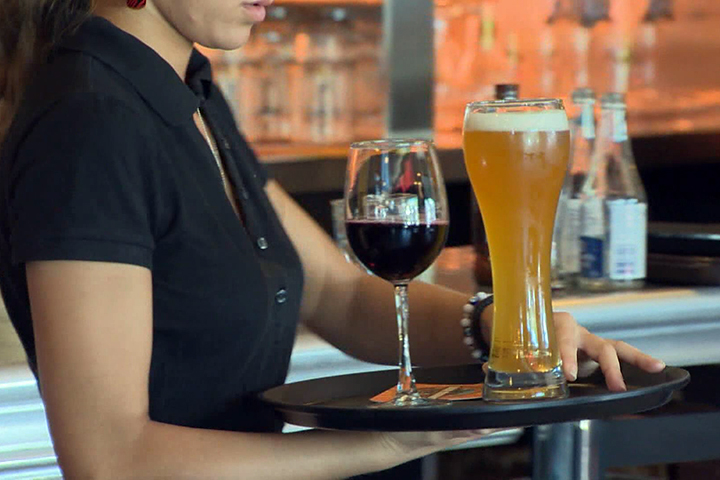TORONTO – Labour groups and some restaurant owners say the Ontario Human Rights Commission’s recent report on sexualized dress codes is not entirely in touch with the realities of life in the industry.

They agree with the commission’s assertion that restaurants and bars should never force female staff to wear skimpy clothing as part of a work uniform.
But they argue that speaking up against such dress codes, as politicians suggest, wouldn’t bring about the change the commission is hoping for.
Instead, they say the woman in question is likely to wind up having her hours reduced or losing her job altogether.
READ MORE: Ontario employers should end gender-specific dress codes: report
Some also say they worry the report sends a message that revealing clothes are shameful and stigmatizes those who do choose to wear them.
They say the ideal situation is one in which male and female restaurant staff have an equal choice to wear whatever they want.
The Commission issued a policy paper on gender-specific dress codes Tuesday to coincide with International Women’s Day, calling for an end to clothing requirements that discriminate against female and transgender workers.
Chief commissioner Renu Mandhane called on employers to do away with uniforms that reinforce gender stereotypes and decried the notion that a staff member’s worth was directly tied to her appearance.
The paper prompted Ontario Women’s Issues Minister Tracy MacCharles to say female employees should feel empowered to speak up and voice complaints if they have concerns about their dress code.
One of Canada’s largest unions lauded the commission for flagging the issue for broader discussion, but said the report presents an idealized vision of life in the restaurant business.
WATCH: Bier Markt backtracks on skimpy dress code for female employees
Debora De Angelis, national co-ordinator for strategic campaigns with the United Food and Commercial Workers union, said the business is an inherently unstable one rife with temporary positions offering erratic hours.
Such conditions leave female workers vulnerable to reprisals, she said, adding they also exacerbate the risks faced by any agitator trying to instigate change in their field.
“When we’re going out and we’re organizing workers, they know that if they step up and they say something against a policy or against the management’s unfair tactics, that they’re going to be disciplined or terminated,” De Angelis said in a telephone interview.
The policy paper has no mechanism to enforce the standards they’re pushing for, she said, adding legislation would be the most effective way to level the playing field.
MacCharles has previously indicated that new laws were not the best way to address the issue, saying she preferred to focus on businesses that were taking proactive steps to implement fair policies.
“I am pleased, however, that this issue has been brought to the surface and that the conversation is growing,” she said in a statement.
“As the conversation develops, I am committed to continue working with my cabinet colleagues to build on the work we’ve already done through our Sexual Violence and Harassment Plan because we know there is always more that we can do.”
One major chain occasionally criticized for its scantily clad servers has already announced plans to revisit the issue in light of the commission’s position.
A spokesman for Earls released a statement saying the dress code is being tweaked to revise the terms of the suggested dress code for women.
Cate Simpson said current rules suggest women wear skirts but can switch to pants upon request.
“We should be wording our suggested dress code as a black skirt no shorter than one inch above the knee or a straight cut plain black pant,” Simpson said in the statement.
“We were unaware we were in contravention of the Ontario Human Rights Code until it was released March 8th and consequently female servers will now be offered the choice of pants or a skirt rather than having to request it.”
Simpson said the ultimate goal is for uniform suggestions to be the same for both male and female employees.
Equality is at the heart of concerns one Ottawa restaurant feels about the commission’s approach, as well as it’s attempt to voice those concerns in public.
READ MORE: Original Joe’s, Boston Pizza servers claim mandatory high heel policies
On Wednesday night, male servers at Union Local 613 donned miniskirts and high heels in part to show solidarity for women who are required to project a sexy image on the job.
But co-owner Ivan Gedz said he’s also hoping to combat some of the stigma surrounding people who do opt to wear skimpy attire.
He said the complexity of the issue was brought home to him by patrons who criticized the move, falsely believing he was trying to shame people who choose a more provocative approach to dress.
“In my ignorance, I just assumed it was obvious that the sleazy part was the mandating of this dress code by people, not the dress code itself,” he said, adding that staff of all genders should be free to wear what they please on the job.



Comments